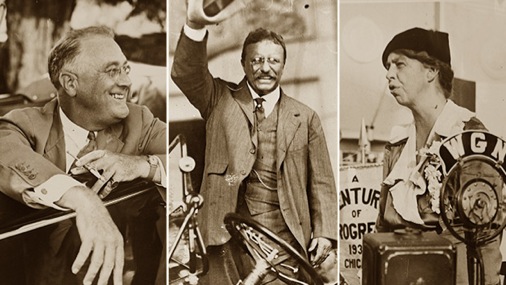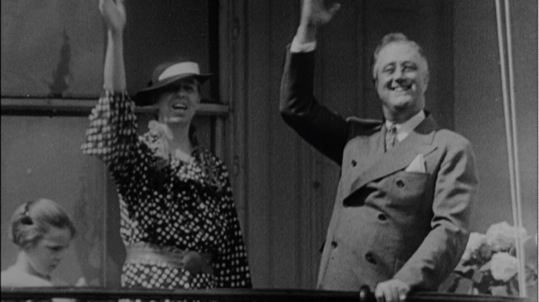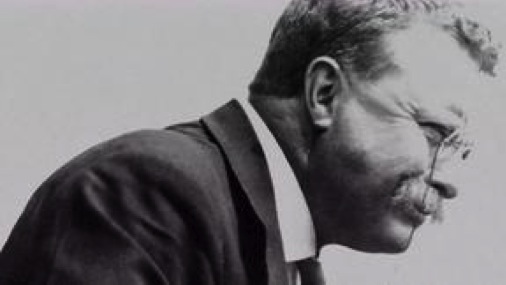The Roosevelts: An Intimate History is triumphant even by Ken Burns' standards
09/12/14 10:35 AM

Premiering: Sunday, Sept. 14th at 7 p.m. (central) on PBS and continuing nightly at the same time through Saturday, Sept. 20th
Voiced by: Meryl Streep, Paul Giamatti, Edward Herrmann, Patricia Clarkson, Billy Bob Thornton, John Lithgow, Ed Harris and others
Directed by: Ken Burns
Written by: Geoffrey C. Ward
Narrated by: Peter Coyote
By ED BARK
@unclebarkycom on Twitter
It’s tempting and no doubt premature to trumpet PBS’ The Roosevelts: An Intimate History as Ken Burns’ masterwork.
Here’s a guy, after all, with The Civil War, Baseball, Jazz and The War under his belt, with another epic, Vietnam, yet to come.
Even in that context, Burns’ 14-hour The Roosevelts may well be the television program of the year -- or maybe even the decade. The imprints they left are enormous. Their personal lives are equally indelible. “This is the story of the Roosevelts,” narrator Peter Coyote says early in Sunday’s first of seven two-hour chapters. “No other American family has ever touched so many lives.” No kidding.
This first intertwining of Theodore, Franklin and Eleanor Roosevelt captures them in all their grand, poignant, self-absorbed glory. Images are wedded to words in ways that prompt continued wonderment. It’s history-telling beyond compare, with a soap opera overlay that, were it not all true, might be laughed out of the writing rooms of even the most preposterously plotted daytime serial.
And then there’s Meryl Streep. She brilliantly voices Eleanor Roosevelt, making every recitation of her words a mini-event. Paul Giamatti and Edward Herrmann are solid and sturdy stand-ins for Theodore and Franklin Roosevelt. But Streep simply soars, capturing the lilt, the passion and the heartbreak of a plain-spoken, even plainer-looking feminist long before the term was coined. Orphaned at an early age and called “Granny” by her dismissive mother, Eleanor was the anti-Jackie Kennedy in terms of glamor and style. But she endured constant indignities and emerged in her own right after her towering husband’s death. Streep is with Eleanor every step of the way, breathing new life into an indomitable woman of substance whose psyche never succumbed to its deep bruises.
Burns also has selected his on-camera “talking heads” with exceeding care. Historian Geoffrey C. Ward, who wrote this entire series, is very much among them. Old standbys David McCullough and Doris Kearns Goodwin also weigh in with their usual telling insights. But the real revelation of The Roosevelts is George Will, whose straight-ahead observations cut to the chase and keep leaving a mark.
As president, both Theodore and Franklin “regarded the Constitution as a nuisance” that shouldn’t and wouldn’t get in their way, Will says in Chapter 1.
And later: “Theodore Roosevelt, we should say this bluntly, liked war.” Therefore he should be viewed with “dry eyes,” not misty, sentimental ones.
In Chapter 5, Will notes that “the presidency is like a soft leather glove, and it takes the shape of the hand that’s put into it.” And when a president “stretches the office,” as Franklin did, the glove never goes back to its original size.

All seven chapters are first-rate. But if you only watch one of them, make it Chapter 4. It mostly deals with how Franklin, at the age of 39, began the day of Aug. 10, 1921 as a healthy, vigorous man before waking up the next day without being able to walk. Doctors eventually determined that he had contracted infantile paralysis, the longer term for polio.
Ward, himself a polio survivor, gets emotional in describing what befell the man who would go on to serve an unprecedented four terms as president.
“It produces terror, unreasoning terror,” he says, his voice breaking. “You just can’t believe that the legs that you depended on simply don’t work.”
Roosevelt later insisted that “I’m not going to be conquered by a childish disease.” And he wasn’t. But the man who became president in the throes of The Great Depression and later guided the country through World War II would never walk again without heavy braces and the assistance of aides whose arms he tightly clasped for balance.
This chapter also includes incredibly poignant footage of FDR at the Warm Springs, Georgia retreat that began as a resort before he turned it into a rehab center for fellow polio victims. Although he brooded in private, Roosevelt beamed in the soothing pool waters, where a semblance of walking was possible. He cavorted as an equal with those who shared his disabilities.
Suzanne Pike, among the few Warm Springs survivors who met the future president, recalls that he always had nicknames for everyone. He asked if he could call her “Suzy.” In turn, many of them dubbed him “Rosie.” By the end of this chapter, after 10 years of struggle, depression and elation, America is calling him their President.
“The only thing we have to fear is fear itself,” he said famously at the first of his four inaugurations. “Nameless, unreasoning, unjustified terror.”
Relationship-wise, Franklin was a fifth cousin of Theodore Roosevelt, whose very troubled brother, Elliott, was Eleanor’s father. Theodore became godfather to his niece, Eleanor, for whom he felt considerable affection. When Franklin and Eleanor married, Uncle “Teddy,” the sitting president, gave her away. But The Roosevelts has no pictures of the three of them together. Which means they likely don’t exist.

Teddy Roosevelt likewise overcame considerable personal tragedy en route to becoming a full-throttle president that some called a “steam engine in trousers,” according to Will.
His mother and his wife died on the same day, the latter after giving birth to their first child, Alice. TR left the baby in his sister’s care and then ran from his demons by remaining in perpetual motion, according to historians. “Roosevelt was a high-functioning neurotic,” says Evan Thomas.
As such, he became a manly ranchman out West who craved the scent of battle and eventually breathed it in deeply as the head of The Roughriders. They trained in Texas and then became renowned for a bloody charge up San Juan Hill in Cuba during the Spanish-American War of 1898. A total of 89 Roughriders were killed or wounded. But TR deemed it “fun” and became a hero to many.
“He was a killer. You can’t sanitize that,” says historian Clay Jenkinson. He also quickly became governor of New York, vice president and then the country’s youngest president, at age 42, when President William H. McKinley was assassinated. His trademark tag lines were “Bully” and “Dee-lightful.”
TR fought the big business tycoons of his day; strong-armed the building of the Panama Canal; won a Nobel Peace Prize for his efforts in brokering a treaty between Russia and Japan; and became the country’s foremost conservationist. But the first major event of his post-presidency was a predatory 11-month jaunt to Africa with his son, Kermit.
The footage from this excursion, in Chapter 2, is both amazing and repulsive. Accompanied by 206 porters who carried every manner of baggage, the two Roosevelts killed a total of 512 large birds and animals, including big batches of lions, elephants, rhinoceroses and giraffes. Upon return to New York, they got another hero’s welcome.
The Roosevelts also details the infighting among Teddy’s surviving offspring and FDR, whom most of them loathed as president. At one point, Alice said she’d vote for Adolf Hitler rather than FDR if he ran for a third term. Teddy Jr. also was a constant antagonist. But his embedded zest for combat prompted him to unite behind Franklin when the U.S. entered World War II after the Dec. 7, 1941 bombing of Pearl Harbor.
Teddy Jr. was granted a commission as general, and insisted on leading his troops to shore during D-Day.
“It steadies the men to know I am with them, plodding along with my cane,” he said. Teddy Jr. survived D-Day, but died shortly after -- in uniform -- of a massive heart attack. Earlier during WWII, TR’s despondent son, Kermit, had committed suicide by firing a bullet through his chin.
FDR’s four boys also all fought in World War II. Elliott Roosevelt flew 300-some combat missions and was decorated for valor while Republicans back home continued to question his bravery and accuse the President of giving his sons favorable treatment. Sound familiar?
“I sometimes really hope that one of us gets killed so that they’ll stop picking on the rest of the family,” Elliott said at one point.
The Roosevelts is an “intimate” history, not a “tabloid” one, Burns has emphasized in interviews. But the oft- long distance marriage of Franklin and Eleanor is duly documented. Each had their own companions, with FDR striving to keep his women a secret while approving of Eleanor’s close friendships with several female friends.
Whether any of these relationships was physically consummated remains an open question, at least during these 14 hours of The Roosevelts. What’s clear, though, is that both FDR and Eleanor drew strength from the company of others. Their marriage bore six children, but the bond between them was stretched thin to the point of fraying by the time he succumbed to a cerebral hemorrhage on April 12, 1945.
FDR died at Warm Springs, where his company included his longtime confidante and companion, Lucy Mercer (Rutherford). Eleanor had her usual busy day of activities in Washington, completely unaware that Lucy had re-entered the picture. But she soldiered on, excelling as a pivotal delegate to the United Nations and establishing a new circle of friends, including Dr. David Gurewitsch and his wife, Edna, who’s interviewed in the film.
The Roosevelts is never less than thoroughly compelling, whether marching through its remarkable pageantry of history or re-telling the smaller, personal stories that played out behind the scenes. It’s a remarkable piece of filmmaking that fully rises to the occasion of its remarkable subjects. Television’s new season is upon us, but this is an achievement for all seasons.
GRADE: A
Email comments or questions to: unclebarky@verizon.net
